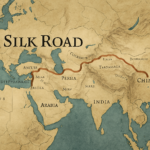
“Islam” means “Peace through the submission to God”.
“Muslim” means “anyone or anything that submits itself to the will of God”.
Islam is not a cult. Its followers number over 1.5 billion worldwide. Along with Judaism and Christianity, it is considered to be one of the three Abrahamic traditions.
There are five pillars of practice in Islam. These practices must be undertaken with the best of effort in order to be considered a true Muslim: A) Shahadah – declaration of faith in the oneness of God and that Muhammad is the last prophet of God. B) Formal prayer five times a day. C) Fasting during the daylight hours in the month of Ramadan. D) Poor-due “tax” – 2.5% of one’s savings given to the needy at the end of each year. E) Pilgrimage to Mecca at least once, if physically and financially able.
There are six articles of faith in Islam. These are the basic beliefs that one must have in order to be considered a true Muslim. They are belief in: A) the One God. B) all the prophets of God. C) the original scriptures revealed to Prophets Moses, David, Jesus, and Muhammad. D) the angels. E) the Day of Judgment and the Hereafter. F) the divine decree (or destiny).
Islam is a complete way of life that governs all facets of life: moral, spiritual, social, political, economical, intellectual, etc.
Islam is one of the fastest growing religions in the world. To become Muslim, a person of any race or culture must say a simple statement, the shahadah, that bears witness to the belief in the One God and that Prophet Muhammad was the last prophet of God.
“Allah” is an Arabic word that means “God”. Muslims also believe that “Allah” is the personal name of God.
Allah is not the God of Muslims only. He is the God of all people and all creation. Just because people refer to God using different terms does not mean that they are different gods. Spanish people refer to God as “Dios” and French people refer to God as “Dieu”, yet they are all the same God. Interestingly, most Arab Jews and Arab Christians refer to God as “Allah”. And the word Allah in Arabic appears on the walls of many Arab churches.
The Islamic concept of God is that He is loving, merciful, and compassionate. But Islam also teaches that He is just and swift in punishment. Nevertheless, Allah once said to Prophet Muhammad, “My mercy prevails over my wrath.” Islam teaches a balance between fear and hope, protecting one from both complacency and despair.
Muslims believe that God has revealed 99 of His names (or attributes) in the Holy Qur’an. It is through these names that one can come to know the Creator. A few of these names are: the All-Merciful, the All-Knower, the Protector, the Provider, the Near, the First, the Last, the Hidden, and the Source of Peace.
Muslims believe in and acknowledge all the prophets of old, from Adam to Jesus. Muslims believe that they brought the message of peace and submission (islam) to different peoples at different times. Muslims also believe that these prophets were “muslims” because they submitted their wills to God.
Muslims neither worship Muhammad nor pray through him. Muslims solely worship the unseen and Omniscient Creator, Allah.
Muslims accept the original unaltered Torah (the Gospel of Moses) and the original Bible (the Gospel of Jesus) since they were revealed by God. However, none of those original scriptures are in existence today, in their entirety. Therefore, Muslims follow the subsequent, final, and preserved revelation of God, the Holy Qur’an.
The Holy Qur’an was not authored by Muhammad. It was authored by God, revealed to Muhammad, and written into physical form by his companions.
The Holy Qur’an has no flaws or contradictions. The original Arabic scriptures have never been changed or tampered with.
Actual seventh century Qur’ans, complete and intact, are on display in museums in Turkey and many other places around the world.
If all Qur’ans in the world today were burned and destroyed, the original Arabic would still remain. This is because millions of Muslims, called Hafiz (or “preservers”) have memorized the text letter for letter from beginning to end, every word and syllable. Also, chapters from the Qur’an are precisely recited from memory by every Muslim in each of the five daily prayers.
Muslims do not believe in the concept of “vicarious atonement” but rather believe in the law of personal responsibility. Islam teaches that each person is responsible for his or her own actions. On the Day of Judgment Muslims believe that every person will be resurrected and will have to answer to God for their every word, thought, and deed. Consequently, a practicing Muslim is always striving to be righteous.
Islam was not spread by the sword. It was spread by the word (Islamic teachings) and the example of its followers. Islam teaches that there is no compulsion in religion (the Holy Qur’an 2:256 and 10:99).
Terrorism, unjustified violence and the killing of innocent people are absolutely forbidden in Islam. Islam is a way of life that is meant to bring peace to a society, whether its people are Muslim or not. The extreme actions of those who claim to be Muslim may be, among other things, a result of their ignorance or uncontrolled anger. Tyrant rulers and those who commit acts of terrorism in the name of Islam are simply not following Islam. These people are individuals with their own views and political agendas. Fanatical Muslims are no more representative of the true Islamic teachings than Timothy McVeigh or David Koresh are of Christianity. Extremism and fanaticism is a problem that is common to all religious groups. Anyone who thinks that all Muslims are terrorists should remember that the famous boxer Muhammad Ali, perhaps the most celebrated person of our era, is a practicing Muslim.
The word “jihad” does not mean “holy war”. Instead, it means the inner struggle that one endures in trying to submit their will to the will of God. Some Muslims may say they are going for “jihad” when fighting in a war to defend themselves or their fellow Muslims, but they only say this because they are conceding that it will be a tremendous struggle. But there are many other forms of jihad which are more relevant to the everyday life of a Muslim such as the struggles against laziness, arrogance, stinginess, or the struggle against a tyrant ruler or against the temptation of Satan, or against one’s own ego, etc.
Women are not oppressed in Islam. Any Muslim man that oppresses a woman is not following Islam. Among the many teachings of Prophet Muhammad that protected the rights and dignity of women is his saying, “…the best among you are those who treat their wives well.” (Tirmidhi)
Islam grants women numerous rights in the home and in society. Among them are the right to earn money, to financial support, to an education, to an inheritance, to being treated kindly, to vote, to a dowry, to keep their maiden name, to worship in a mosque, etc., etc.
Muslim women wear the head-covering (hijab) in fulfillment of God’s decree to dress modestly. From a practical standpoint, it serves to identify one as attempting to follow God in daily life and, therefore, protects women from unwanted advances from men. This type of modest dress has been worn by righteous women throughout history. Prominent examples are traditional Catholic Nuns, Mother Teresa and the Virgin Mary, mother of Jesus.
General FAQs about Islam:
1. What is Islam?
Islam is an Abrahamic monotheistic religion centered on the Quran, which Muslims believe to be the direct word of God (Allah) as revealed to the Prophet Muhammad. It is the second-largest religion in the world, with followers called Muslims. Islam emphasizes submission to God’s will and striving to live a righteous life according to divine guidance.
2. Who is Allah?
Allah is the Arabic word for God, used by Muslims and some Arab Christians and Jews. Muslims believe Allah is the one and only God, the creator and sustainer of the universe, all-knowing, all-powerful, and merciful. Allah is not a generic name for a god, but rather a proper noun referring to the unique God of Islam.
3. Who is the Prophet Muhammad?
Muslims believe Muhammad was the last prophet in a line of prophets sent by God, which includes Abraham, Moses, and Jesus. Muslims believe God revealed the Quran to Muhammad through the angel Gabriel. Muhammad is revered as the final messenger of God and the perfect example of a Muslim life.
4. What is the Quran?
The Quran is the holy book of Islam. Muslims believe it is the literal word of God as revealed to the Prophet Muhammad. It contains guidance on all aspects of life, including worship, ethics, law, and social justice. Muslims believe the Quran is the ultimate source of authority in Islam.
5. What are the Five Pillars of Islam?
The Five Pillars are the core beliefs and practices of Islam:
- Shahada (Declaration of Faith): The belief that there is no god but God (Allah), and Muhammad is his messenger.
- Salat (Prayer): Performing five daily prayers facing the Kaaba in Mecca.
- Zakat (Charity): Giving a portion of one’s wealth to the poor and needy.
- Sawm (Fasting): Abstaining from food and drink from dawn to dusk during the month of Ramadan.
- Hajj (Pilgrimage): Making a pilgrimage to Mecca if physically and financially able.
6. What is the difference between Sunni and Shia Islam?
The division between Sunni and Shia Muslims arose from a disagreement over the succession of leadership after the death of Prophet Muhammad. Sunnis believe the leader should be chosen by consensus among the community, while Shias believe leadership should remain within the Prophet’s family, specifically through his cousin and son-in-law, Ali. Over time, these initial differences led to the development of distinct theological and legal interpretations within the two branches. While there are differences, both Sunni and Shia Muslims adhere to the core beliefs and practices of Islam.
7. What is Sharia law?
Sharia is often translated as “Islamic law,” but it more accurately refers to the divine law derived from the Quran and the Sunnah (the teachings and practices of Prophet Muhammad). Sharia covers a wide range of topics, including worship, ethics, family law, and commerce. Interpretations and implementation of Sharia vary considerably among different Islamic schools of thought and jurisdictions.
8. What is Jihad?
Jihad is an Arabic word that means “struggle” or “striving.” In its broadest sense, it refers to the internal spiritual struggle to live a righteous life according to Islamic principles. It can also refer to the external struggle to defend Islam or fight against injustice. However, some extremist groups have misinterpreted and misused the concept of jihad to justify violence.
9. What is the Kaaba?
The Kaaba is a cube-shaped building located in the Grand Mosque in Mecca, Saudi Arabia. It is the most sacred site in Islam and the direction (qibla) towards which Muslims pray. Muslims believe the Kaaba was originally built by Abraham and his son Ishmael.
10. What are some common misconceptions about Islam?
There are many misconceptions about Islam, often fueled by misinformation and prejudice. Some common misconceptions include:
- That all Muslims are Arabs. Islam is a global religion with diverse ethnicities.
- That Islam promotes violence. While some groups have used violence in the name of Islam, their actions do not represent the beliefs and practices of the majority of Muslims.
- That all Muslim women are oppressed. The experiences of Muslim women are diverse, and interpretations of Islamic teachings on women’s roles vary.
- That Islam is incompatible with modern society. Islam has a rich intellectual and cultural tradition that has contributed to many fields of knowledge.
11. What is Ramadan?
Ramadan is the ninth month of the Islamic calendar, during which Muslims fast from dawn to dusk. It is a time of spiritual reflection, prayer, and charity. Ramadan culminates in the Eid al-Fitr celebration.
12. What are some important Islamic holidays?
Some important Islamic holidays include:
- Eid al-Fitr: Celebrates the end of Ramadan.
- Eid al-Adha: Commemorates Abraham’s willingness to sacrifice his son.
- Mawlid: Celebrates the birth of Prophet Muhammad.
This information is intended for general knowledge and discussion purposes only and does not represent an exhaustive overview of Islamic beliefs and practices. Because interpretations of Islam vary widely, it’s always best to consult with knowledgeable religious leaders or scholars for more in-depth information.









